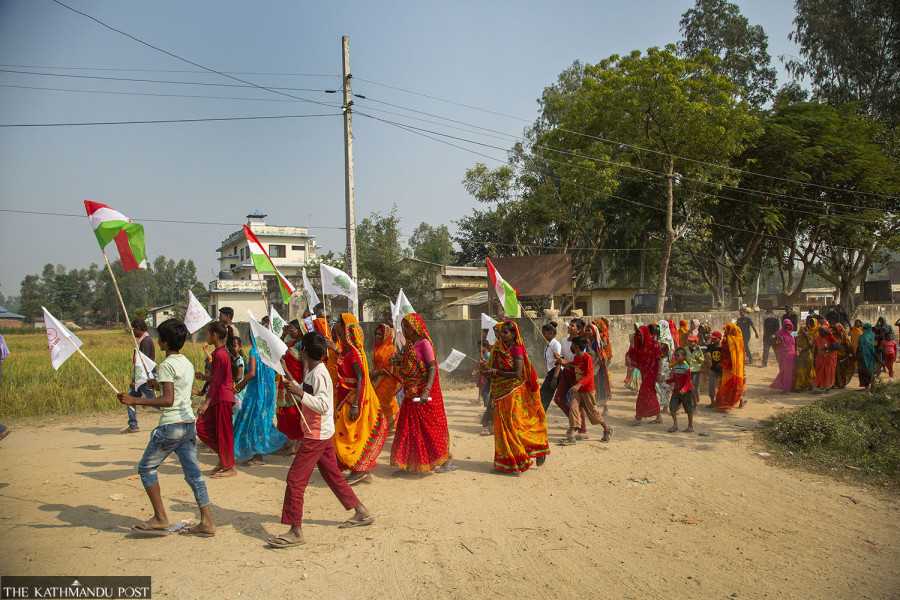Politics
In Madhesh, political ground is shifting
Fourteen years after the Madhesh movement, voters have punished its major faces in the recent polls.
Binod Ghimire
The twin Madhesh uprisings in 2007 and 2008 established Upendra Yadav among the country’s prominent political figures. The uprisings, staged for the rights of the people living in the plains, was led by Madhesi Janadhikar Forum Nepal, of which Yadav was then chief. The protests forced Kathmandu to heed to the demands of the people from the southern plains who faced state’s discrimination for decades.
The movement compelled other parties to embrace federalism and broaden the scope of inclusion. The Madheshi people put their trust in Yadav’s party, giving it 52 seats in the 601-strong first Constituent Assembly in 2008. Other Madhesh based parties—Tarai Madhesh Loktantrik Party and Sadbhavana Party—also won a significant number of seats.
Today, fourteen years since that election, the tides have turned. In the recently-held general election, the Madheshi people rejected Yadav, once the face of the Madhesh movement, badly. Janamat Party Chairperson CK Raut defeated him with an overwhelming margin of 18,073 votes.
Other prominent Madheshi leaders haven’t fared much better either. Loktantrik Samajbadi Party chair Mahantha Thakur and its senior leader Rajendra Mahato were trailing by Wednesday evening. The parties led by Yadav and Thakur had won 10 and 11 seats, respectively, in the 2017 elections for the House of Representatives. The two parties jointly formed the government in Madhesh Province. However, as the vote count nears close, the two parties seem to face debacle in not just the elections for the lower house but also the provincial assembly. As of Wednesday, the Janata Samajbadi Party had won one seat and was leading in four others while Thakur’s party was maintaining leads in just two in addition to one win.
In the provincial assemblies, the Janata Samajbadi Party had won three seats and was leading in nine while the Loktantrik Samajbadi Party had won one and led in seven other seats.
Political analysts say the Madheshi people voted for the Janata Samajbadi Party and Loktantrik Samajadi Party to institutionalise the identity issue in national politics. However, the two parties misused public support to bargain for power. Janata Samajbadi Party, for instance, was a part of the KP Sharma Oli government in 2018. It joined the Sher Bahadur Deuba government later.
Loktantrik Samajbadi Party also showed its hunger for power by joining the Oli government for merely three weeks before the Supreme Court terminated their appointment as ministers.
“The sole mandate the Madheshi people gave to these parties was to keep alive their identity issue,” Vijay Kant Karna, a professor of Political Science at Tribhuvan University, told the Post. “People have punished them whenever they have shown greed for power. The same is happening this time.”
While the strength of the two regional parties is waning from the present elections, other alternative parties seem to be emerging from Madhesh and the country’s west. Raut’s Janamat Party, for one, is making its presence felt in the present elections, though the party seems to be winning only two House seats. While Raut has already won, the party’s candidate maintains a lead in Siraha-2 while it is overtaking the candidates from other parties in four other constituencies.
The Janamat Party is emerging as an alternative in Madhesh because the performance of the two regional parties was dismal despite being in all three tiers of government, according to analysts. “They [Yadav’s and Thakur’s parties] exploited state resources for their petty interests in the name of Madheshi people,” Tula Narayan Shah, a political analyst, told the Post. “The Madheshi people had been closely monitoring their misdeeds.”
In Shah’s observation, the two parties raised the issues of constitution amendment to revise the delineation of the boundaries of the provinces, revise the clusters for reservation and address the long pending issue of citizenship. However, they never strongly pressurised the major parties to this when in power. “You can’t deceive the people for long,” he said. In his view, Janamat Party has a fertile ground to prosper in Madhesh not just by taking the space of two Madheshi parties but also of the Nepali Congress and CPN-UML.
The Congress and the UML are set to become the first and the second largest parties in Madhesh in both lower house and provincial assembly. While the Janamat Party seems to be marching ahead in the region, Nagarik Unmukti Party led by Ranjita Shrestha, the wife of Resham Chaudhary, is faring well in the districts of Lumbini and Sudurpaschim provinces. The party, formed a few months before the local elections, has won one seat and maintained the lead in another. Lal Bir, father of Resham, has won from Bardiya-2. The party was trailing closely the candidates from other parties in two more constituencies.
In the view of observers, the Tharu people have realised that nobody but themselves can raise their voice. The major parties including the Madhesh-based ones used them only as vote banks in the past but did nothing to address their concerns, they say.
Hari Chandra Kamali, an associate professor at Sudur Paschim University, said that while the current victory might not be enough to execute the agenda of the Tharu people, they have given a clear and loud message that their concerns cannot be overlooked.
“The historically marginalised Tharu community will have its true representative in the federal parliament and Lumbini Provincial assemblies to raise their voices this time,” Kamali said. “This had never happened in the past.”




 18.12°C Kathmandu
18.12°C Kathmandu















